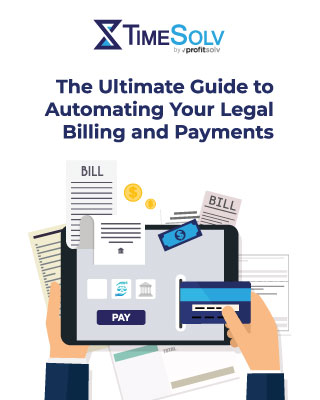From booking trips with Bitcoin to touchless checkout for fast food and groceries, we live in a world where new payment options seem to pop up every day.
And although its evolution is more gradual, the legal industry’s approach to payment is changing, too. These days, when it comes to accepting payment from your legal clients, you’ve got dozens of options to choose from.
So, how do you know which payment processor is right for your law firm?
How payment processors differ
All payment processors serve the same core purpose: collecting payment from clients for services rendered. Does it really matter which one you use?
Yes!
Payment processors may seem similar on the surface, but they differ in key ways, such as:
- Fees
- Features
- Security
- Customer support
These aspects affect a law firm’s profitability, client experiences, productivity, and even compliance with stringent legal industry requirements.
Whether you’re just beginning your search for a payment processor for your firm or narrowing down your shortlist, read the fine print to ensure you’re investing in the right solution.
How to tell if your payment processor is right for your law firm
If any of the following statements aren’t true, it might be time to make the switch to a more legal-friendly solution.
1. Funds arrive when you need them
Operating costs don’t wait for clients who don’t pay their legal bills on time.
Without a steady infusion of cash, your firm can’t meet vendor obligations or plan for growth. Once your clients finally submit payment, waiting a week or more to access your money simply isn’t feasible.
With next-day funding, you can get paid within 24 hours after clients settle their invoices and feel confident about your firm’s finances.
2. Fees are fair and transparent
The best things in life are free. The best payment processors…aren’t. But that doesn’t mean you have to pay more than necessary. Reputable processors will always be clear about the amounts and reasons for all transaction fees.
Some payment processing companies offer different fees for different payment methods, while others charge a flat fee across the board. As you examine your options, be wary of confusing fee structures, as they can dig deeply (and unexpectedly) into your revenue over time.
Putting some thought into which fee structure is most profitable and convenient for your firm can help you reduce your expenses and improve profitability. (It pays to be future-focused here, too. What’s smart for your law firm today might be detrimental to your growth.)
3. The payment process is convenient for clients and staff alike
At this point, we all can agree that electronic payment processing is more convenient than traditional paper-based methods. Still, not all methods of making an electronic payment are created equal.
While some clients may be willing to take the time to log into a separate portal or remember a unique password to pay your firm, others won’t. This can delay payment, leading to unnecessary stress and inconvenience for everyone involved.
Modern legal payment options accommodate clients and attorneys across the spectrum with secure, accessible, device-agnostic payment options.
The Ultimate Guide to Automating Your Legal Billing and Payments
To stay competitive in today’s legal landscape, law firms must embrace the power of technology, especially when it comes to billing and payments.
The best way to improve your law firm’s cash flow while also increasing client convenience is 'Automation'.
Download our free guide to improve your legal billing and payment process today!
4. Time tracking, invoicing, and billing are streamlined
A good payment processor should create a consolidated experience for time capture, billing, invoicing, and payment collection.
Managing all your financial tasks within a single platform saves time and money. But it also provides a clearer picture of your firm’s overall cash flow so you can make more informed financial decisions.
To streamline things further, look for an option that is designed for law firms and allows clients to make direct payments toward retainer replenishment. This improves accounting accuracy and provides a safeguard against compliance violations due to commingling funds.
5. It keeps pace with modern technology
Law firms aren’t known for jumping onto trends that could risk exchanging compliance and security for convenience. Still, it’s beneficial to keep pace with evolving payment technology.
Payment processors that implement automation capabilities, such as recurring billing and payment plans, create a more efficient billing process that prioritizes your clients’ convenience and saves attorneys time.
Your clients will also appreciate fresh features like real-time payment tracking, mobile payment options, and the ability to conveniently check trust account balances.
6. It doesn’t skimp on security
Electronic payments are extremely appealing to clients, law firms, and—unfortunately—hackers, too. As a result, security is a top priority for any business that utilizes them. Law firms, in particular, have a duty to protect clients’ confidential information.
Several built-in security levels, bank-grade encryption, and a Payment Card Industry (PCI) Level 1 Service Provider certification can help prevent sensitive payment information from falling into the wrong hands.
7. Compliance is built in
Many merchants have never heard of legal compliance guidelines, let alone incorporated them into the development of their payment processors.
By contrast, payment processing solutions designed specifically for law firms have built-in compliance measures to ensure that attorneys meet ABA and state bar trust accounting regulations.
This can take the form of ethically compliant functionality, like:
- Detailed real-time reporting
- Clear, consistent audit trails
- Separation of funds
- Extra safeguards to ensure fees are deducted or deposited to the proper account
8. Support is there when you need it
Taking care of your clients is a challenge when you can’t get the support you need. Ideally, you won’t have to contact customer support for your payment processor often. However, when you do, you should be able to count on the fact that your issue will be resolved quickly and effectively.
9. The data reflects a difference
Evaluating your payment processor is an important step toward streamlining billing and reducing your firm’s accounts receivable.
TimeSolv has created a patent-pending method that, when implemented, has resulted in collection rates of 97+%—a significant increase in revenue when you consider that the industry’s average collection rate is around 88%.
Stop your search. Try TimeSolvPay today!
Thousands of law firms like yours trust TimeSolv with their billing and payment. TimeSolv supports law firms with features like:
See the benefits for yourself when you sign up for a free trial.
The Ultimate Guide to Automating Your Legal Billing and Payments
To stay competitive in today’s legal landscape, law firms must embrace the power of technology, especially when it comes to billing and payments.
The best way to improve your law firm’s cash flow while also increasing client convenience is 'Automation'.
Download our free guide to improve your legal billing and payment process today!


